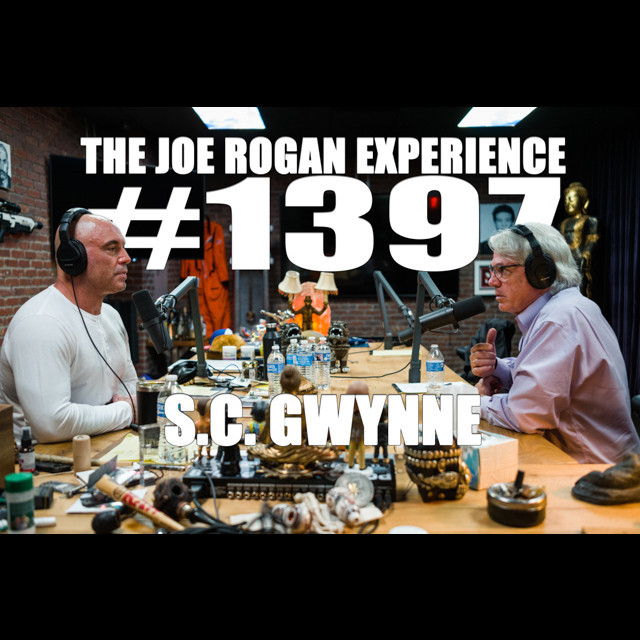10-Dec-19
This Joe Rogan podcast episode takes listeners on a riveting journey into the history of the Comanche tribe, exploring their rise to power, their unique culture, and their eventual clash with westward expansion. The conversation revolves around S.C. Gwynne’s book, “Empire of the Summer Moon,” and his subsequent book, “Hymns of the Republic,” offering a rich tapestry of history, cultural insights, and the enduring legacy of the Comanche people.
Provocative topics include the brutality of the frontier, the Comanche’s mastery of warfare, the tragic story of Cynthia Ann Parker, and the enduring power of their cultural legacy. Underlying themes explore the clash of cultures, the definition of freedom, the impact of westward expansion, and the importance of preserving history.
Topics Explored:
- The Rise of the Comanche:
- The Comanche were the preeminent horse tribe in the American West, achieving dominance through their mastery of the horse.
- They established a vast empire spanning 250,000 square miles, primarily in the southern plains.
- Their military prowess, fueled by their mastery of horses and raiding tactics, made them the most powerful tribe in American history.
- The Comanche’s stripped-down, Spartan-like culture, focused on warfare and survival, set them apart from other Native American tribes.
- The Captivity of Cynthia Ann Parker:
- The tragic story of Cynthia Ann Parker, a young white girl kidnapped by the Comanche, provides a poignant lens into the brutal realities of the frontier.
- Cynthia Ann assimilated into Comanche life, marrying a war chief, and raising a family, demonstrating the power of cultural influence.
- Her forced reintegration into white society highlights the struggle of reconciling different cultural perspectives and the loss of identity.
- Cynthia Ann’s story emphasizes the resilience of the human spirit and the enduring strength of cultural bonds.
- The Comanche’s Culture of Freedom:
- The Comanche’s nomadic lifestyle and emphasis on freedom, embodied in their hunting, raiding, and warrior culture, stood in stark contrast to the westward expansion of the United States.
- The Comanche embraced a world filled with magic and spirituality, as evidenced by their rituals and beliefs.
- The Comanche’s flat hierarchical structure allowed for individual initiative and a sense of boundless freedom.
- Their way of life serves as a reminder of the allure of a simpler, more primal existence, a stark counterpoint to the growing complexities of modern society.
- The Clash of Cultures:
- The arrival of white settlers in the Comanche territory marked a significant turning point, leading to a brutal clash of cultures.
- The Comanche and the white settlers each perceived the other as a threat, leading to a long and violent struggle for control of the land.
- The white settlers, unfamiliar with the Comanche’s warfare and their mastery of the land, found themselves unprepared for the challenges they faced.
- The Comanche’s powerful resistance to the westward expansion of the United States provides a poignant reminder of the consequences of unchecked ambition and the importance of respect for cultural diversity.
- The Rise of the Texas Rangers:
- The Texas Rangers, originally formed to combat the Comanche, evolved into a formidable force, mirroring the Comanche’s fighting style.
- The adoption of the Colt revolver, a technological breakthrough, fundamentally shifted the balance of power in warfare against the Comanche.
- The Texas Rangers’ reputation for ruthlessness and their ability to adapt to Comanche tactics underscored the intensity of the conflict.
- Their story highlights the evolving nature of warfare and the enduring impact of technological innovation.
- The Legacy of Quanta Parker:
- Quanta Parker, the son of Cynthia Ann Parker and a Comanche war chief, became a pivotal figure in bridging the gap between the Comanche and the white settlers.
- His assimilation into white society, marked by his success as a cattle rancher, stands in stark contrast to his heritage and upbringing.
- He played an active role in the Comanche Nation, advocating for their rights and interests, demonstrating the complex realities of negotiating between cultures.
- His story highlights the enduring power of cultural identity and the challenges of navigating a world in constant flux.
- The Importance of Preserving History:
- The podcast touches upon the importance of preserving historical sites like Quanta Parker’s house, a tangible link to the Comanche past.
- The preservation of history serves as a reminder of past events, fostering understanding and empathy across generations.
- The lack of written Comanche history presents a unique challenge in documenting their rich culture and traditions, emphasizing the fragility of oral history.
- The podcast underscores the importance of oral storytelling, historical documentation, and the responsibility to ensure the voices of marginalized communities are heard.
Memorable Quotes:
- “I just went in as a reporter and reported without any particular agenda. Not because I’m a noble person, but just because I didn’t have any agenda. I just reported the book and I thought, this is interesting, and this is interesting.”
- “The comanches were not just a plains tribe. They were the preeminent power on this southern plane.”
- “What made the Comanche special was that they became the preeminent horse tribe. Nobody was their peer.”
- “It’s so recent. It’s unbelievable. It’s one of the most striking things about this to me… It’s a really close generation memory.”
- “The actual truth is somewhere in the middle. And you do a great job of depicting that. Both sides are responsible for atrocities.”
